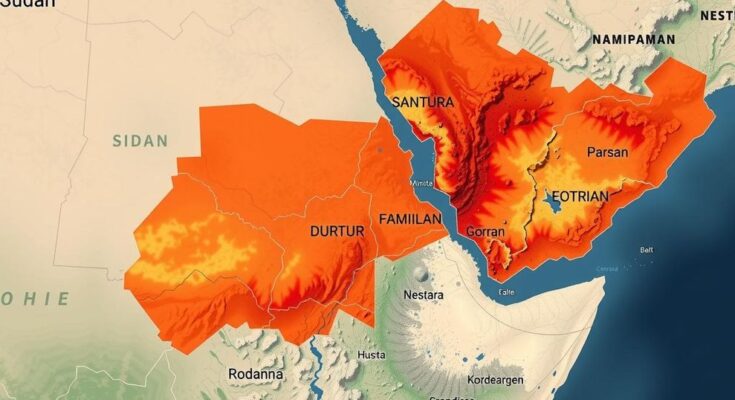Sudan faces a severe famine crisis affecting 24.6 million people due to a 20-month civil war. Experts warn of worsening conditions and potential expansion of famine into additional areas, emphasizing the urgent need for international aid and peace efforts to combat this humanitarian disaster.
Sudan is currently experiencing an escalating famine crisis, with food experts declaring that approximately 24.6 million individuals, nearly half of the nation’s population, are in dire need of food assistance. This humanitarian catastrophe has been driven by the ongoing civil conflict, which has persisted for 20 months. Famine conditions have now affected five regions, with acute malnutrition and starvation becoming increasingly severe.
The devastating effects of the war between the Sudanese Armed Forces and the paramilitary Rapid Support Forces have significantly undermined food security nationwide. Mediations aimed at resolving the conflict, which ignited following a joint coup in 2021, have produced no successful outcomes. Consequently, experts warn that without an end to hostilities, a greater humanitarian disaster is imminent.
The Famine Review Committee (FRC), connected to the Integrated Food Phase Classification (IPC), has reported that famine was originally identified in August within the Zamzam refugee camp and has since also affected the Abu Shouk and al-Salam camps in el-Fasher, along with two additional regions in South Kordofan. The FRC emphasized that famine represents an extreme level of human suffering, signifying a catastrophic disintegration of health, livelihoods, and social structures critical for survival. Furthermore, predictions indicate that famine may spread to five more areas in Darfur by May, with up to 17 additional sites also at risk.
Conflict in these areas has severely disrupted agricultural activities, leading to abandoned farms and widespread looting. Civilian casualties have mounted, with reports of violence including killings, abductions, and sexual assaults. In an alarming statement, the U.S. special envoy for Sudan indicated that estimates suggest around 150,000 people have perished as a result of the ongoing conflict.
The civil war in Sudan has been marked by escalating violence, specifically a power struggle between the Sudanese Armed Forces and the Rapid Support Forces, which transformed a political coup into a prolonged humanitarian crisis. This environment has severely affected food production and access, contributing to the rapid deterioration of living conditions for millions. The IPC, a collaborative initiative by United Nations agencies, governmental bodies, and non-profit organizations, aims to assess and address famine conditions globally, highlighting the severe impact of the Sudanese conflict on food security and the lives of its citizens. With hunger spreading rapidly across several regions, expert analysis underscores the urgency of intervention to avert further catastrophe.
In conclusion, Sudan is descending into a severe famine crisis exacerbated by an enduring civil war, which has compromised food security for millions. With widespread acute malnutrition and starvation gripping the nation, significant international intervention is needed to address the humanitarian needs. The potential for famine to affect more areas underscores the urgency to restore peace and stability in the region to safeguard the lives and livelihoods of the Sudanese populace.
Original Source: www.bbc.com




